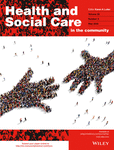Factors related to screening for problem gambling among healthcare and social service providers in Ontario, Canada: A concept mapping study
Funding information
This project received funding support from the Ministry of Health and Long-Term Care through the Health Systems Research Fund (Ministry Grant #438). Dr. Guilcher is supported by a Canadian Institutes for Health Research Embedded Clinician Scientist Salary Award (2016-2020) working with Health Quality Ontario.
Abstract
Problem gambling is a major public health concern, especially among persons who are precariously housed, living in poverty or have complex health and social needs. Problem gambling has been connected to negative health and social outcomes; however, current healthcare services rarely screen for problem gambling. With support from community partners, the purpose of this study was to understand factors related to screening for problem gambling. Concept mapping, a mixed-method approach driven by participatory involvement, was conducted with healthcare and social service providers from Ontario, Canada in 2019. Three phases were conducted with participants either in-person or online: Brainstorming, Sorting/Rating and Mapping. Brainstorming sessions were conducted to generate statements, guided by the focal prompt: “If you were directed to routinely screen for problem gambling, what would help you do this in your daily practice?” Participants sorted statements into categories and rated them based on their importance and feasibility. A mapping session was conducted with participants to co-create visual representations of the data. Thirty participants took part in the in-person or online concept mapping sessions. During the brainstorming sessions, participants generated 213 statements, which the research team condensed into a final list of 45 statements. Participants decided that the five-cluster map best represented these 45 statements and labelled the five clusters: (a) top level (macro), (b) screening tool, (c) staff skills and training, (d) screening, and (e) team resources and support. Staff skills and training was rated as the most important and the most realistic cluster to implement, while screening was rated relatively as the least important when compared to the other clusters. Team resources and support was rated relatively as the least realistic cluster. By identifying the needs of healthcare and social service providers, this study co-developed actionable suggestions that will assist providers in routinely screening for problem gambling.
CONFLICTS OF INTEREST
The authors report no potential competing interests with respect to the research, authorship and/or publication of this article.




